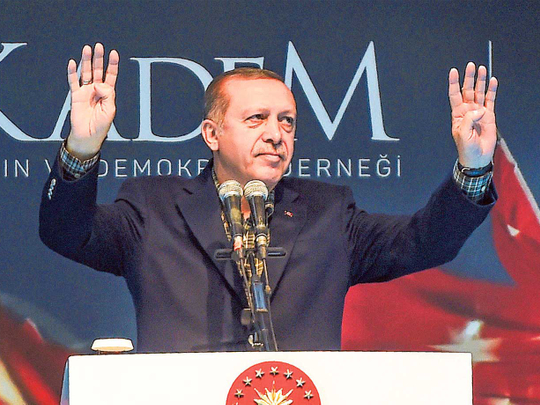
Chancellor Angela Merkel rejects President Recep Tayyip Erdogan's comments accusing Germany of Nazi-style practices as "absurd," , her spokesman said, as the cancellation of rallies by Turkish politicians widens a rift between the two Nato allies.
In Germany's sharpest response yet, Merkel's chief spokesman, Steffen Seibert, catalogued several "deep differences of opinion" between the two governments, including over freedom of the press. He urged Turkish leaders to keep "a cool head" and emphasized trade and other ties binding the two nations together, while saying that campaigning by Turkish officials is possible in Germany within the law.
"Nazi comparisons are always absurd and out of place, because they only serve to trivialize National Socialist crimes against humanity," Seibert told reporters in Berlin on Monday.
The flareup risks further straining Turkey's relations with the entire European Union as EU foreign ministers meet in Brussels on Monday. The government in Ankara has jailed a German-Turkish reporter whom Erdogan described as a spy, and is pressing Germany to extradite fugitive Turkish military officers involved in the coup attempt.
Erdogan lashed out in Istanbul on Sunday in comments widely reported in Germany after two municipalities canceled campaign events by two of Erdogan's ministers in the buildup to a Turkish referendum next month. The comments rapidly escalated tensions that were already strained by Turkey's human rights record after a failed coup to topple Erdogan last July.
Expatriate votes
With an estimated 1.4 million Turkish voters living in Germany, the decisions last week to scrap the campaign events have "nothing to do with democracy," Erdogan said, and are "not different from Nazi practices."
The Turkish leader is holding a vote in April to transform the ceremonial presidency into the nation's top government executive. European leaders have accused Erdogan of concentrating power as the government cracks down on dissent.
The town of Gaggenau in southwestern Germany triggered the turmoil last week by revoking its permission for Turkish Justice Minister Bekir Bozdag to hold a campaign rally, citing concerns of overcrowding. In Cologne, authorities canceled Economy Minister Nihat Zeybekci's planned address on Sunday to a Turkish community, citing security concerns.
Merkel last week condemned the jailing of German-Turkish journalist Deniz Yucel, 43, as "bitter and disappointing," saying the charges of terrorist propaganda threatened press freedom in Turkey. Peter Altmaier, her chief of staff, said Monday that Germany didn't need lessons in democracy and called Erdogan's comments unacceptable.
Refugee accord
For all the criticism by German leaders, Turkey and the EU have shared interests beyond trade.
Erdogan and the EU last March forged a deal to stem the flow of refugees entering Greece via the Aegean, with Turkey agreeing to take back people turned away. The uneasy accord that helped ease the trade bloc's refugee crisis is unlikely to be upended by Erdogan amid new tensions with Germany, according to its Austrian partner.
The EU is a critical trade partner for Turkey, taking 47 percent of its exports in January. Germany was the No. 1 export destination for Turkish goods, accounting for 10 percent, according to Turkey's statistics agency.
"Let's speak to each other openly and critically, but let's keep an eye on the importance of our German-Turkish partnership "" and let's keep a cool head," Seibert said.












